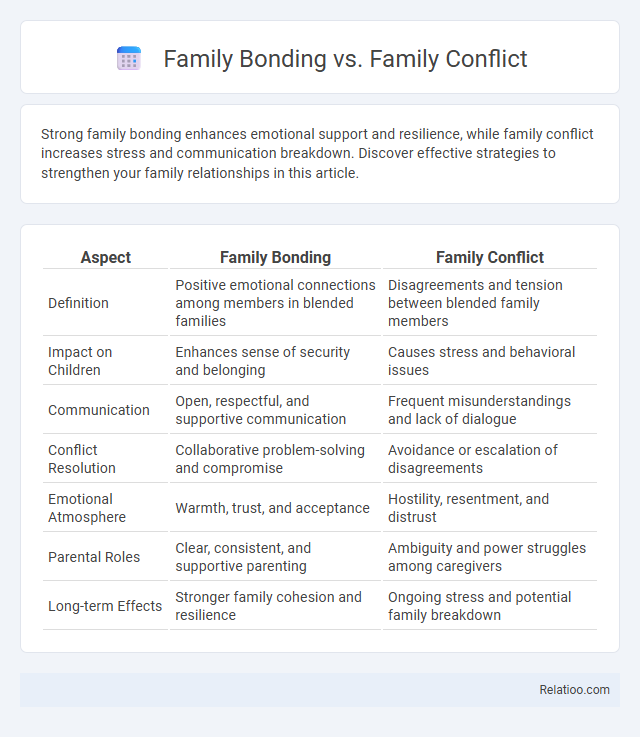Strong family bonding enhances emotional support and resilience, while family conflict increases stress and communication breakdown. Discover effective strategies to strengthen your family relationships in this article.
Table of Comparison
| Aspect | Family Bonding | Family Conflict |
|---|---|---|
| Definition | Positive emotional connections among members in blended families | Disagreements and tension between blended family members |
| Impact on Children | Enhances sense of security and belonging | Causes stress and behavioral issues |
| Communication | Open, respectful, and supportive communication | Frequent misunderstandings and lack of dialogue |
| Conflict Resolution | Collaborative problem-solving and compromise | Avoidance or escalation of disagreements |
| Emotional Atmosphere | Warmth, trust, and acceptance | Hostility, resentment, and distrust |
| Parental Roles | Clear, consistent, and supportive parenting | Ambiguity and power struggles among caregivers |
| Long-term Effects | Stronger family cohesion and resilience | Ongoing stress and potential family breakdown |
Understanding Family Bonding: The Foundation of Healthy Relationships
Family bonding serves as the cornerstone of healthy relationships by fostering trust, emotional support, and effective communication among members. In contrast, family conflict often arises from misunderstandings and unresolved disagreements, which can weaken these essential connections. Promoting family unity through consistent bonding activities helps to mitigate conflicts and strengthen the overall relational stability within the household.
Common Causes of Family Conflict
Common causes of family conflict often include miscommunication, financial stress, and differing values or expectations among members. These conflicts can undermine family bonding by creating emotional distance and reducing trust, which hampers your ability to foster family unity. Understanding and addressing these root causes helps promote healthier interactions and strengthens the overall cohesion within your family.
Effects of Strong Family Bonds on Individual Well-being
Strong family bonds significantly enhance individual well-being by providing emotional support, reducing stress, and promoting a sense of belonging. Your mental health benefits from family unity, as it fosters resilience against life's challenges and encourages positive behaviors. Conversely, family conflict can lead to increased anxiety, decreased self-esteem, and impaired social functioning, highlighting the importance of nurturing close, harmonious relationships.
The Impact of Family Conflict on Mental Health
Family conflict significantly increases the risk of mental health issues such as anxiety, depression, and stress among family members, disrupting emotional stability and overall well-being. Frequent exposure to hostile interactions or unresolved disputes can lead to chronic psychological distress and impair interpersonal relationships. Promoting family bonding and unity acts as a protective factor, enhancing communication, emotional support, and resilience against mental health challenges.
Communication Strategies for Enhancing Family Bonding
Effective communication strategies are essential for enhancing family bonding by fostering understanding and reducing conflicts that disrupt family unity. Active listening, open dialogue, and expressing empathy help resolve misunderstandings and build trust among family members. Your commitment to consistent, positive communication strengthens emotional connections and promotes a harmonious family environment.
Identifying and Resolving Sources of Family Conflict
Family conflict often arises from miscommunication, differing values, or unresolved past issues, creating barriers to family unity. Identifying sources of conflict requires active listening, empathy, and recognizing individual needs within the family dynamic. Resolving these conflicts through open dialogue and collaborative problem-solving strengthens family bonding and fosters lasting unity.
The Role of Family Activities in Strengthening Bonds
Family activities play a crucial role in strengthening bonds by fostering communication, trust, and shared experiences that reduce family conflict and promote unity. Engaging in regular, meaningful activities helps your family create positive memories and develop a supportive environment where challenges can be addressed collectively. Prioritizing time together enhances emotional connections and stabilizes family dynamics, transforming potential conflicts into opportunities for growth and cohesion.
Setting Boundaries to Reduce Family Conflict
Setting clear boundaries is essential to reduce family conflict and promote family unity by defining acceptable behaviors and personal limits. When family members respect these boundaries, it fosters mutual understanding and strengthens family bonding through increased trust and communication. Establishing consistent rules and open dialogue helps prevent misunderstandings and emotional tension, creating a supportive environment for healthy relationships.
Cultural Perspectives on Family Bonding and Conflict
Cultural perspectives on family bonding and conflict reveal significant variations in how families express unity and address disagreements, with collectivist cultures often emphasizing harmony and interdependence to maintain strong family ties. In these cultures, conflict resolution typically involves indirect communication and prioritizing group cohesion, whereas individualistic cultures may encourage open expression of differences to foster personal growth within the family. Understanding your cultural background enhances awareness of these dynamics, allowing for more effective navigation of family unity and conflict resolution strategies.
Building Resilience: Overcoming Family Conflict Together
Building resilience within your family requires addressing conflicts openly and fostering a culture of understanding and support. Family bonding strengthens emotional connections, enabling members to navigate challenges collectively, while unresolved family conflict can weaken these ties and increase stress. Prioritizing family unity through honest communication and empathy transforms conflicts into opportunities for growth and lasting harmony.

Infographic: Family Bonding vs Family Conflict
 relatioo.com
relatioo.com